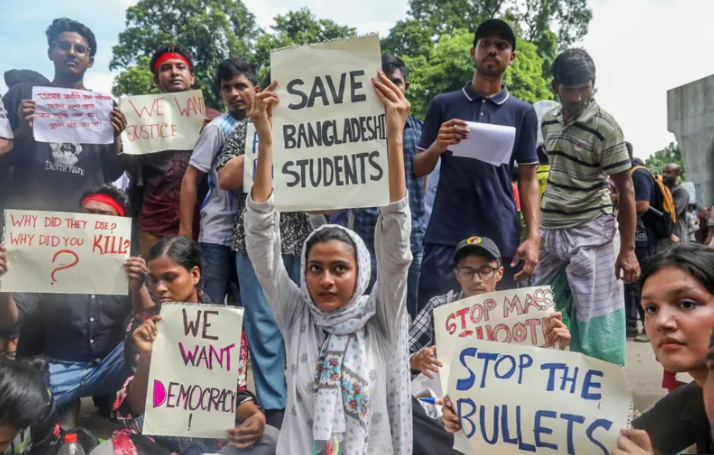Anti-Reservation Protests in Bangladesh (GS Paper 2, IR)

Introduction
- In Bangladesh, recent anti-reservation protests have ignited significant unrest, with over 100 casualties reported.
- The protests center around the country’s job quota system, which allocates a substantial portion of government jobs to specific groups, including the families of those who fought in the Bangladesh Liberation War.
- This system has been criticized for its perceived inequities and for benefiting the ruling party disproportionately.
- The unrest has not only led to severe disruptions in Dhaka but also drew international attention due to its implications for both domestic politics and regional relations.
Main Cause of Protests
The primary driver of the protests is dissatisfaction with Bangladesh’s government job quota system. This system reserves 56% of government jobs for various groups:
- Freedom Fighters' Families: 30% of positions are reserved for the descendants of those who participated in the 1971 Liberation War.
- Other Reservations: The remaining 26% includes 10% for women, 10% for individuals from underdeveloped districts, 5% for indigenous communities, and 1% for persons with disabilities.
Protesters' Grievances:
- Perceived Discrimination: Many protesters believe that the quota system unfairly benefits families connected to the ruling Awami League, a party with deep historical ties to the Liberation War. They argue that this system perpetuates a cycle of favoritism and hinders fair access to government jobs.
- Demand for Abolition: The demonstrators are calling for the complete abolition of the quota system, claiming that it exacerbates unemployment and limits opportunities for merit-based candidates.
Underlying Issues
Unemployment Crisis
- The job market in Bangladesh is characterized by a significant imbalance between job seekers and available positions.
- Each year, around 4 lakh candidates vie for 2,000-3,000 government jobs, highlighting a severe supply-demand mismatch.
- This imbalance fuels frustration and desperation among job seekers, contributing to the intensity of the protests.
Government's Position
- Quota Utilization: The Bangladeshi government contends that the quota for freedom fighters’ families is underutilized, with only 10% of these positions being filled. The government has taken steps to address concerns by eliminating quota facilities for first-class and second-class government jobs, aiming to balance fairness and merit.
- Recent Reforms: In response to criticism, the government has introduced reforms to reduce the impact of the quota system. However, these measures have not fully quelled dissent or resolved the underlying issues driving the protests.
Awami League and Historical Context
- Role in Liberation War: The Awami League, under the leadership of Sheikh Mujibur Rahman, played a pivotal role in Bangladesh’s struggle for independence from Pakistan in 1971. This historical significance contributes to the complexity of the current protests, as Rahman’s legacy and the party’s continued dominance influence public perceptions of the quota system.
- Current Leadership: Prime Minister Sheikh Hasina, the daughter of Sheikh Mujibur Rahman, leads the Awami League. Her familial connection to the nation’s founding adds another layer of contention, with critics arguing that the ruling party disproportionately benefits from the quota system.
India’s Stand
- Neutral Stance: India has adopted a neutral position, referring to the protests as an internal matter for Bangladesh. This approach reflects the strategic importance of maintaining positive relations with Bangladesh, where Prime Minister Sheikh Hasina is viewed as a key ally in regional politics.
- Advisory to Nationals: In light of the unrest, the Indian mission in Dhaka has advised Indian nationals to limit travel and remain cautious. This advisory underscores the potential impact of the protests on broader regional dynamics and international relations.
Conclusion
- The anti-reservation protests in Bangladesh represent a critical juncture in the country’s socio-political landscape.
- The dissatisfaction with the job quota system, combined with historical and political complexities, has led to significant unrest and casualties.
- Addressing the root causes of these protests requires a multifaceted approach, including reforms to the quota system, improved job market strategies, and enhanced communication between the government and the public.
- The situation highlights broader issues of equity and opportunity, which are central to Bangladesh's ongoing development and stability.


